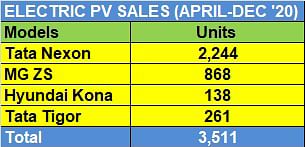Electric PV sales to hit record high in FY2021, e-SUVs lead the charge
With 3,511 units sold in the first nine months of FY2021, India’s e-passenger vehicle segment will see a new high. Electric SUVs, led by the Tata Nexon, benefit from growing demand.
The numbers per se may not be very flattering but the fact of the matter is that the electric passenger vehicle (PV) segment is set to record its best year of sales this fiscal (FY2021).
In the first nine months of the ongoing fiscal (April-December 2020), a total of 3,511 electric PVs have been sold, going past the 3,400 units sold in all 12 months of FY2020 and just 89 short of FY2019’s 3,600 units. Given the monthly sales momentum, the FY2019 total would have been surpassed in January 2021 itself. And, with two months still to go for closure of FY2021, clearly India's electric PV industry industry is set to record a new high.

A close look at SIAM’s India industry sales statistics for April-December 2020 reveals that electric SUVs are leading the charge in overall electric PV sales, leaving the electric car segment behind. The data table above indicates that e-SUVs have turned the tables on e-cars in the past 9 months and also helped accelerate growth in the overall electric vehicle segment.
What is also a fact is that other than the Tigor, there is no other electric passenger car in the market. In comparison, the SUV market has seen a gaggle of new product launches in the past year, which are paying off for their OEMs.
Between April-December 2020, a total of 261 electric cars (all Tata Tigor sedans) have been sold in India, down 79% year-on-year from the 1,262 units sold in April-December 2019. And with consumers taking charge of 3,250 e-SUVs, this constitutes a 1,000-plus% YoY growth albeit on a low year-ago base. While the proportion of e-cars to total passenger car sales (12,91,234 units) has fallen from 0.10% in April-December 2019 to 0.03%, correspondingly the share of e-SUVs has risen from 0.40% to 0.48% percent in April-December 2020.

Nexon EV leads, Tata Motors has 71% of e-PV market
Making a huge difference to the entire electric PV segment is the Tata Nexon EV, which completed 12 months of market sales in India on January 28, 2021. The game-changing Nexon EV has sold a total of 2,244 units in the April-December 2020 period, accounting for 64% of total sales in the segment. Add the Tigor sedan (261) to the equation and that gives Tata Motors a 71% share of the electric PV market in India.
What is drawing buyers to the Nexon EV is compelling value proposition. The Tata Nexon EV has modern tech- like a connectivity suite and a number of goodies, such as a sunroof, and it feels like the first electric car from the company that could serve as an alternative to a petrol car. Expect the 30.2kWh battery to last 180-220km in the real world. Autocar India’s review of the electric Tata compact SUV showed it is quick off the line, effortless and decently fun-to-drive too. Nexon EV prices start Rs 264,000 higher than the top-spec Nexon XZA+ DT (O) petrol-automatic and end Rs 464,000 higher, which is a significant premium but clearly that is not deterring eco-friendly buyers.
The No. 2 seller in the electric PV market is the MG ZS EV with 868 units. This direct rival to the Hyundai Kona Electric, which sold 138 units in April-December 2020, boasts a longer real-world range from its 44.5kWh battery pack (as this comparison between the ZS EV and Kona Electric reveals), more cabin space and a long list of equipment; there are some features that are missing from a car in this class though. ZS EV prices also undercut Hyundai’s EV by a small margin. Nonetheless, a standard 5-year warranty pack helps the all-electric MG SUV’s case.
Will the Union Budget 2021, now just two days ago, give an added charge to sales of electric PVs and the overall EV industry? Watch this space.
READ MORE:
Every electric car, SUV currently on sale in India
Tata Motors’ entire PV portfolio can go electric
RELATED ARTICLES
Cosmo First diversifies into paint protection film and ceramic coatings
The Aurangabad, Maharashtra-based packaging materials supplier is leveraging its competencies in plastic films and speci...
JSW MG Motor India confident of selling 1,000 M9 electric MPVs in first year
The 5.2-metre-long, seven-seater luxury electric MPV, which will be locally assembled at the Halol plant in Gujarat, wil...
Modern Automotives targets 25% CAGR in forged components by FY2031, diversifies into e-3Ws
The Tier-1 component supplier of forged components such as connecting rods, crankshafts, tie-rods, and fork bridges to l...






 30 Jan 2021
30 Jan 2021
 77717 Views
77717 Views





 Autocar Professional Bureau
Autocar Professional Bureau




